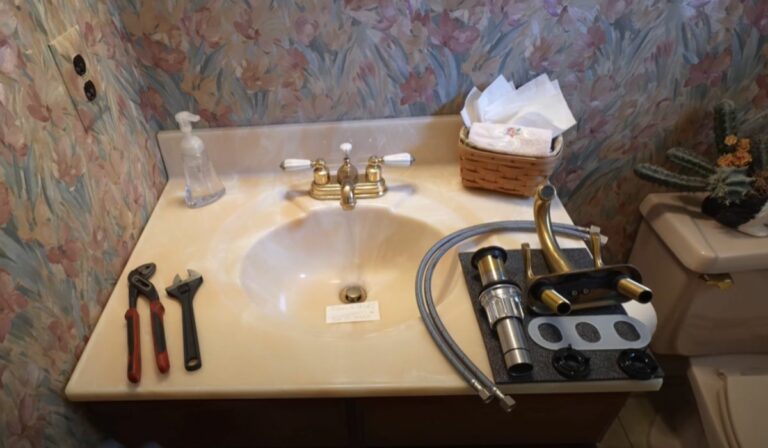How to Tell if Water Heater Is Gas or Electric
You can tell if your water heater is gas or electric by checking its power connections and venting. If you see a metal gas line with a valve or a vent pipe running outside or through the roof, it’s likely gas. Electric models have electrical wires entering a junction box and lack venting. Also, gas heaters usually have a burner access panel and control knobs, while electric ones have thermostats with reset buttons. Keep exploring to uncover more details.
Check the Power Source and Connections
Before you begin inspecting your water heater, check its power source and connections to quickly determine whether it’s gas or electric.
Look behind or near the unit for a visible gas line—usually a metal pipe connected to a valve. If you spot this, your heater runs on gas.
If you don’t see a gas line, turn your attention to the electrical connections. Electric water heaters typically have thick electrical cables entering a metal junction box on top or the side.
You might also notice a dedicated circuit breaker labeled for the water heater in your main electrical panel.
Identifying these connections will save you time and guide you through the proper maintenance steps, ensuring you handle the unit safely and correctly based on its energy source.
Examine the Water Heater’s Exterior Features
Once you’ve identified the power source, take a close look at the water heater’s exterior features to gather more clues about its type.
Gas water heaters often have a metal burner access panel near the bottom, where the flame ignites, while electric models usually lack this.
You might also notice an electric water heater has one or two electrical conduit connections protruding from the top or sides.
Check for a thermostat dial or control knobs on the front—these are common on electric heaters.
The tank’s shape can hint as well; gas heaters typically have a vent or flue pipe at the top (though you’ll examine venting in the next step), whereas electric ones won’t.
These exterior details help confirm whether your water heater runs on gas or electricity.
Look for a Venting System
If your water heater uses gas, you’ll likely see a venting system attached to it. This vent allows harmful combustion gases, like carbon monoxide, to safely exit your home.
Look for a metal pipe or chimney connected to the top or side of the heater. It usually runs vertically, leading outside or up through the roof.
Electric water heaters don’t need this venting because they don’t burn fuel.
If you spot a vent, it’s a clear sign you’re dealing with a gas unit. Make sure the vent is securely connected and free of rust or damage, as proper ventilation is crucial for safe operation.
Spotting this feature quickly helps you identify the heater type without guessing.
Identify the Control Panel and Thermostat Type
While inspecting your water heater, check the control panel and thermostat type to help determine whether it’s gas or electric.
Electric water heaters typically have one or two accessible thermostats with metal covers located on the side of the tank. These thermostats allow you to adjust the temperature directly and often feature a reset button.
Gas water heaters usually lack external thermostats; instead, they’ve a control knob or dial on the gas control valve near the bottom, often marked with settings like “Pilot,” “On,” or temperature levels. This gas control valve regulates the burner flame.
Review the Manufacturer’s Label or Model Number
Because every water heater comes with a manufacturer’s label, you can quickly identify whether your unit is gas or electric by checking it. Locate the label, usually found on the side of the tank or near the top.
It includes key details like the model number, serial number, and energy source. Look for words like “gas,” “natural gas,” or “propane” if it’s gas-powered.
If you see terms such as “electric” or “120V/240V,” it indicates an electric heater.
You can also enter the model number online to find specific information about your water heater. This step is straightforward, reliable, and helps you confirm the type before making any adjustments or repairs.
Frequently Asked Questions
Can I Convert a Gas Water Heater to Electric?
You can’t directly convert a gas water heater to electric since they use different systems. Instead, you’d need to replace the gas unit with an electric one and adjust your home’s electrical setup accordingly.
Which Type of Water Heater Is More Energy Efficient?
Electric water heaters are generally more energy efficient since they convert nearly all electricity into heat, while gas heaters lose some energy through venting. However, your local energy costs and usage affect which is cheaper overall.
How Often Should I Service a Gas Versus Electric Water Heater?
You should service your gas water heater annually to ensure safe operation and efficiency. For electric water heaters, servicing every two years is usually sufficient, but always check your manufacturer’s recommendations for the best care.
Are There Safety Risks Specific to Gas Water Heaters?
Yes, gas water heaters pose safety risks like gas leaks, carbon monoxide poisoning, and explosion hazards. You should regularly inspect vents and connections, install detectors, and ensure proper ventilation to keep your home safe.
What Are the Typical Lifespan Differences Between Gas and Electric Heaters?
Gas water heaters usually last about 8-12 years, while electric ones can last 10-15 years. You’ll find electric models often have a longer lifespan because they face less wear from combustion and heat exposure.
Conclusion
Now that you know how to check the power source, look for vents, and examine the control panel, you can easily tell if your water heater is gas or electric. Don’t forget to review the manufacturer’s label or model number for confirmation. Understanding these key features helps you maintain your water heater properly and ensures safety. With this knowledge, you’ll feel confident identifying your water heater type in no time.

